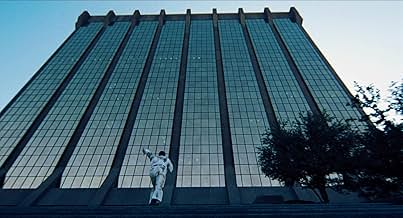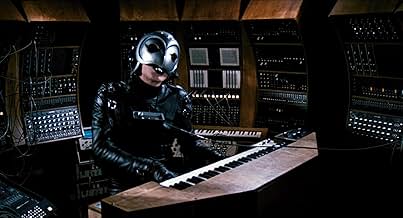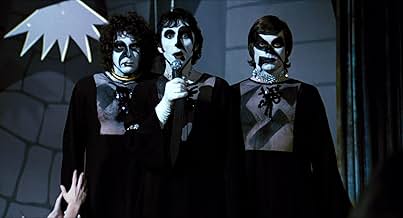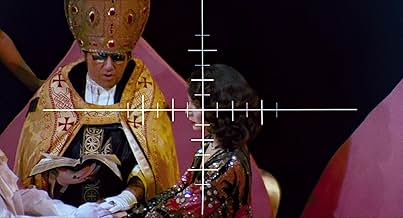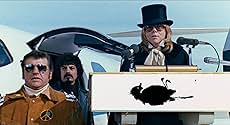Un compositor desfigurado vende su alma porque la mujer a quien ama ejecute su música, pero un perverso magnate musical lo traiciona y roba su obra para abrir The Paradise, un bar de rock.Un compositor desfigurado vende su alma porque la mujer a quien ama ejecute su música, pero un perverso magnate musical lo traiciona y roba su obra para abrir The Paradise, un bar de rock.Un compositor desfigurado vende su alma porque la mujer a quien ama ejecute su música, pero un perverso magnate musical lo traiciona y roba su obra para abrir The Paradise, un bar de rock.
- Dirección
- Guionistas
- Elenco
- Nominado a 1 premio Óscar
- 3 premios ganados y 5 nominaciones en total
Peter Elbling
- The Juicy Fruits
- (as Harold Oblong)
- …
- Dirección
- Guionistas
- Todo el elenco y el equipo
- Producción, taquilla y más en IMDbPro
Opiniones destacadas
Mix "the Phantom of the Opera" with "Faust" and "the Picture of Dorian Gray", sprinkle it all with 1970's electric glam-rock, Gothic horror and uttermost baroque scenery and costumes. And there you get "Phantom of the Paradise", a picture that has everything to be the perfect cult movie, and would deserve much more attention than its more famous counterpart "The Rocky Horror Picture Show", released one year later.
Whereas "Rocky Horror" remains a farce all the way through, "Phantom of the Paradise" is a real tragedy in the original meaning : the story of a genial but naive musician who gets his work swindled by an evil baby-faced producer who has sold his soul to the Devil. Besides, "Phantom" is more a film about music or a film with songs in it than a proper musical, and it's better so because the story is really interesting. Like "Rocky Horror", " Phantom" is full of parody and incredible gimmicks, but the plot and the soundtrack are far superior, and on the whole, "Phantom" has a lot more class.
Many people who have seen the movie when it was released were teenagers, and it's one of those movies I know many people to have seen ten times or more. Looked at from a mature point of view, it is true that "Phantom" appears somewhat kitsch and not so profound, and it is obvious that the director must have had great fun shooting such a delirious show. But let's say then that as "typical midnight movie", "Phantom of the Paradise" remains a gripping and creative kitsch masterpiece, and still keeps up with its cult movie status thirty years after. That's what classics are all about.
Countless scenes and details would deserve comments, but let's say that two of them are really hard to forget: when the hero gets his face destroyed in a record-press after his escape from Sing-Sing in a toy box, and when he murders the campy music-hall star who usurped his music in the middle of the stage, by shooting a neonlight across his chest as the climax of a hysterical rock concert.
Interesting to know that the same three singers successively impersonate a parody of a sixties group with banana hairdos and falsetto voices, a nutty band in pants and wigs, and finally appear with ominous black and white make-up in a hard-rock performance that reminds of "Kiss". I guess you wouldn't tell if you didn't know.
The casting is very good although none of the actors seemed to have achieved real stardom. You don't get to see so much of William Finley because he wears a mask throughout much of the film, but Paul Williams, who has had a rather mediocre singing career, was perfect for the role as machiavelic producer Swan. The angelic blond face and the malign nature of the character make a very powerful contrast.
However, I found the most impressive performance was given by Jessica Harper. Her big dark eyes and deep voice make her stand out both as an accomplished actress and singer. Her talent has been unfortunately never used any better than in this movie, which was her first star role, and that's "the hell of it".
As for director Brian de Palma, I have not seen many of his films outside of this one, so I'm not too sure, but it looks like "Phantom" really has a place apart in his career. For instance, "Carrie", which got more attention, appeared very disappointing to me in comparison, much more like a B-grade horror flick. Mr de Palma certainly seems to have a fascination for blood, and "Phantom" has of course its fair share of it. Contracts are even signed with blood instead of ink...
Whereas "Rocky Horror" remains a farce all the way through, "Phantom of the Paradise" is a real tragedy in the original meaning : the story of a genial but naive musician who gets his work swindled by an evil baby-faced producer who has sold his soul to the Devil. Besides, "Phantom" is more a film about music or a film with songs in it than a proper musical, and it's better so because the story is really interesting. Like "Rocky Horror", " Phantom" is full of parody and incredible gimmicks, but the plot and the soundtrack are far superior, and on the whole, "Phantom" has a lot more class.
Many people who have seen the movie when it was released were teenagers, and it's one of those movies I know many people to have seen ten times or more. Looked at from a mature point of view, it is true that "Phantom" appears somewhat kitsch and not so profound, and it is obvious that the director must have had great fun shooting such a delirious show. But let's say then that as "typical midnight movie", "Phantom of the Paradise" remains a gripping and creative kitsch masterpiece, and still keeps up with its cult movie status thirty years after. That's what classics are all about.
Countless scenes and details would deserve comments, but let's say that two of them are really hard to forget: when the hero gets his face destroyed in a record-press after his escape from Sing-Sing in a toy box, and when he murders the campy music-hall star who usurped his music in the middle of the stage, by shooting a neonlight across his chest as the climax of a hysterical rock concert.
Interesting to know that the same three singers successively impersonate a parody of a sixties group with banana hairdos and falsetto voices, a nutty band in pants and wigs, and finally appear with ominous black and white make-up in a hard-rock performance that reminds of "Kiss". I guess you wouldn't tell if you didn't know.
The casting is very good although none of the actors seemed to have achieved real stardom. You don't get to see so much of William Finley because he wears a mask throughout much of the film, but Paul Williams, who has had a rather mediocre singing career, was perfect for the role as machiavelic producer Swan. The angelic blond face and the malign nature of the character make a very powerful contrast.
However, I found the most impressive performance was given by Jessica Harper. Her big dark eyes and deep voice make her stand out both as an accomplished actress and singer. Her talent has been unfortunately never used any better than in this movie, which was her first star role, and that's "the hell of it".
As for director Brian de Palma, I have not seen many of his films outside of this one, so I'm not too sure, but it looks like "Phantom" really has a place apart in his career. For instance, "Carrie", which got more attention, appeared very disappointing to me in comparison, much more like a B-grade horror flick. Mr de Palma certainly seems to have a fascination for blood, and "Phantom" has of course its fair share of it. Contracts are even signed with blood instead of ink...
A composer has his music stolen by a big-time record producer and vows his revenge. Things get more complicated after he gets sent to jail and apparently commits suicide in the river...
Howard Maxford feels the film is "dated", and that is the best criticism one can make of the film. The songs do not hold one's attention well. The plot in general is decent, but the music -- a central focus of the movie -- is just average.
Brian de Palma, the director of "Carrie" and "Black Dahlia", is in charge here. He makes a visually appealing film, with angles and colors that call to mind Stanley Kubrick's "2001" and "A Clockwork Orange", as well as Dario Argento's "Suspiria" (which star Jessica Harper would appear in after this film).
Gerrit Graham ("TerrorVision") as Beef is great, and a nice send-up of glam rock. The critics had called the film "funny" and "hilarious", but both are exaggerations. The humor is very subtle, with this being a musical first, horror film second and comedy third.
The references to Dorian Gray are awesome, and unspoken. There are also cues from Poe and previous "Phantom" films. Some have said there is even an homage to Orson Welles' "Touch of Evil" (and I believe them, but I have not seen the film yet). Sissy Spacek is credited as a "set dresser"... you decide what that means.
Howard Maxford feels the film is "dated", and that is the best criticism one can make of the film. The songs do not hold one's attention well. The plot in general is decent, but the music -- a central focus of the movie -- is just average.
Brian de Palma, the director of "Carrie" and "Black Dahlia", is in charge here. He makes a visually appealing film, with angles and colors that call to mind Stanley Kubrick's "2001" and "A Clockwork Orange", as well as Dario Argento's "Suspiria" (which star Jessica Harper would appear in after this film).
Gerrit Graham ("TerrorVision") as Beef is great, and a nice send-up of glam rock. The critics had called the film "funny" and "hilarious", but both are exaggerations. The humor is very subtle, with this being a musical first, horror film second and comedy third.
The references to Dorian Gray are awesome, and unspoken. There are also cues from Poe and previous "Phantom" films. Some have said there is even an homage to Orson Welles' "Touch of Evil" (and I believe them, but I have not seen the film yet). Sissy Spacek is credited as a "set dresser"... you decide what that means.
This viewer feels obliged to point out that his hometown - Winnipeg, Canada - is one of the two cities in the world to truly embrace Brian De Palmas' operatic spoof of the glam rock era. (The other being Paris, France.) Therefore, it's mystifying that it should have taken me so long to finally watch it, but now I'm glad that I have.
It's a thoroughly flamboyant, marvelously designed and decorated rock musical that combines the themes of Phantom of the Opera, Faust, and The Picture of Dorian Gray. William Finley stars as Winslow Leach, a naive, trusting singer-composer who is taken advantage of by conniving producer Swan (who's played by real-life singer-composer-actor Paul Williams). Several circumstances later, the disfigured Leach seeks revenge against Swan while falling madly in love with aspiring pop star Phoenix (the radiant Jessica Harper).
The late, great character star Finley and the engaging Williams were never better than in this funny and fast paced exercise in style. It gets off to a great start with opening narration by none other than Rod Serling. Well shot, by Larry Pizer, and designed, by Jack Fisk, it features some thoroughly catchy ditties by Williams. The parodies of such performers as Sha-Na-Na and the Beach Boys are spot on. De Palma is also most effective at capturing the insanity of the emerging shock-rock trend, especially with the effeminate rocker Beef, one of the all- time best roles for top character actor Gerrit Graham.
Harper is beautiful and extremely appealing and it's a shame that neither she nor Graham nor anyone else here ever became big stars. Williams is great fun, and Finley fully embraces the tragic arc of his character. Heavy set George Memmoli is also solid as Swans' gopher Philbin.
This film manages to maintain that feeling of fun throughout while also being rather sad at the same time.
Trivia note: Fisks' wife, actress Sissy Spacek, who went on to play the title role in De Palmas' next film, the feature adaptation of Stephen Kings' "Carrie", was the set dresser here. And look for such familiar 70s actresses as Jennifer Ashley, Janit Baldwin, Janus Blythe, Robin Mattson, Patrice Rohmer, and Cheryl Smith among the groupies.
Eight out of 10.
It's a thoroughly flamboyant, marvelously designed and decorated rock musical that combines the themes of Phantom of the Opera, Faust, and The Picture of Dorian Gray. William Finley stars as Winslow Leach, a naive, trusting singer-composer who is taken advantage of by conniving producer Swan (who's played by real-life singer-composer-actor Paul Williams). Several circumstances later, the disfigured Leach seeks revenge against Swan while falling madly in love with aspiring pop star Phoenix (the radiant Jessica Harper).
The late, great character star Finley and the engaging Williams were never better than in this funny and fast paced exercise in style. It gets off to a great start with opening narration by none other than Rod Serling. Well shot, by Larry Pizer, and designed, by Jack Fisk, it features some thoroughly catchy ditties by Williams. The parodies of such performers as Sha-Na-Na and the Beach Boys are spot on. De Palma is also most effective at capturing the insanity of the emerging shock-rock trend, especially with the effeminate rocker Beef, one of the all- time best roles for top character actor Gerrit Graham.
Harper is beautiful and extremely appealing and it's a shame that neither she nor Graham nor anyone else here ever became big stars. Williams is great fun, and Finley fully embraces the tragic arc of his character. Heavy set George Memmoli is also solid as Swans' gopher Philbin.
This film manages to maintain that feeling of fun throughout while also being rather sad at the same time.
Trivia note: Fisks' wife, actress Sissy Spacek, who went on to play the title role in De Palmas' next film, the feature adaptation of Stephen Kings' "Carrie", was the set dresser here. And look for such familiar 70s actresses as Jennifer Ashley, Janit Baldwin, Janus Blythe, Robin Mattson, Patrice Rohmer, and Cheryl Smith among the groupies.
Eight out of 10.
This is an absurd and wildly entertaining glam-rock twist on the "Phantom of the Opera" story. Winslow Leach has his rock opera stolen by music biz icon Swan. After terrorizing the record company, Leach is in an awful (but rather hilarious!) accident that renders him disfigured. He terrorizes the opening night of Swan's new rock'n'roll palace, The Paradise.
This is the best horror film I've seen by De Palma. While it is mostly tongue-in-cheek, it does feature one of the most suspenseful uses of his trademark "split screen." The story is great--a surprisingly clever indictment of the music industry. The music is wonderful if you like glam, though the songs that Jessica Harper (the Christine figure) sings seem out of place and are about as deadpan as her performance. Gerrit Graham is a riot as Beef and steals every scene he is in. I recommend "Phantom of the Paradise" to fans of over-the-top productions such as Rocky Horror, as well as anyone looking for a unique twist on a classic tale that doesn't take itself too seriously. My Rating: 7.5/10
This is the best horror film I've seen by De Palma. While it is mostly tongue-in-cheek, it does feature one of the most suspenseful uses of his trademark "split screen." The story is great--a surprisingly clever indictment of the music industry. The music is wonderful if you like glam, though the songs that Jessica Harper (the Christine figure) sings seem out of place and are about as deadpan as her performance. Gerrit Graham is a riot as Beef and steals every scene he is in. I recommend "Phantom of the Paradise" to fans of over-the-top productions such as Rocky Horror, as well as anyone looking for a unique twist on a classic tale that doesn't take itself too seriously. My Rating: 7.5/10
This is probably one of those ones that most people either love or hate, so there isn't that much point in trying to sell it to anyone. I've been hugely attached to it since it came out. I don't think I'm alone in saying that it's "my" answer to Rocky Horror (which to me is simply "entertaining" - which is no insult). A lot of people seem to really dislike Paul Williams. But, love him or hate him, he threw himself completely into the role of Swan. To me, Swan is one of the best comical or semi-comical villains ever (it took me a long while to think of it, but I wonder whether his use of the word "Excellent" in one scene might have inspired Mr. Burns' line on The Simpsons). Everyone else was very good in it, obviously Gerritt Graham as Beef, and George Memmoli as Philbin. I wish , in the first place, that there were FEWER tongue-in-cheek horror films (or whatever you want to call them), and in the second place, that they were as original as this one.
¿Sabías que…?
- TriviaThe record press in which the character Winslow Leach is disfigured was in fact a real pressing plant (it was an injection-molding press at an Ideal Toy Company plant). William Finley was worried about whether the machine would be safe, and the crew assured him it was. The press was fitted with foam pads (which resemble the casting molds in the press) and there were chocks put in the center to stop it from closing completely. However, the machine was powerful enough to crush the chocks that it gradually kept closing. It is commonly believed that Finley pulled his head out of the press just in time to avoid being injured, and that his scream in that scene was genuine, but this is an exaggeration. Finley was quickly pulled out by grips and the record press scene, along with most scenes in the movie with little dialogue, was filmed without sound, and the talking and sound effects were dubbed in later. At a Phantom of the Paradise convention, Finley exaggerated the story and said that his scream was "for real", although he may have meant that he was able to conjure up a very real scream in post-production by thinking back to his memories of the incident.
- ErroresVideotape was still only in the experimental development phase in 1953, when Swan records his suicide note/contract, and at that it was only capable of black and white images. Color, broadcast quality videotape of the kind depicted here was not available until the late 1950s.
- Citas
The Phantom: [to Beef] Never sing my music again. Not here, not anywhere. Do you understand? Never again. My music is for Phoenix. Only she can sing it. Anyone else who tries, dies!
- Créditos curiososThe closing credits feature a series of montages of the cast members, identifying each by name, starting with the musical trio (Oblong, Hahn, Comanor) and concluding with William Finley as Winslow/The Phantom. These montages are made up of shots ostensibly from the movie, and most of them are, but there are also numerous outtakes.
- Versiones alternativasIn the pre-release (or press) prints of the movie, the scene where Winslow was disfigured by the record press was longer; His disfigured face was briefly seen steaming with smoke from the press, and Winslow then killed the cop that surprised him (and shot him in the leg, which explained why Winslow walked with a limp for most of the film; however, he was able to run with the greatest of ease towards the end). The scene was removed from subsequent versions, as it was best decided that Winslow's disfigured visage be revealed at the end of the film.
- ConexionesFeatured in Terror en los pasillos (1984)
- Bandas sonorasGoodbye, Eddie, Goodbye
Written by Paul Williams
Performed by Jeffrey Comanor, Archie Hahn and Peter Elbling as The Juicy Fruits, lead vocal Archie Hahn
Selecciones populares
Inicia sesión para calificar y agrega a la lista de videos para obtener recomendaciones personalizadas
- How long is Phantom of the Paradise?Con tecnología de Alexa
Detalles
- Fecha de lanzamiento
- País de origen
- Idioma
- También se conoce como
- Fantasma del paraíso
- Locaciones de filmación
- Productoras
- Ver más créditos de la compañía en IMDbPro
Taquilla
- Presupuesto
- USD 1,300,000 (estimado)
- Total a nivel mundial
- USD 2,245
- Tiempo de ejecución1 hora 31 minutos
- Color
- Relación de aspecto
- 1.85 : 1
Contribuir a esta página
Sugiere una edición o agrega el contenido que falta


